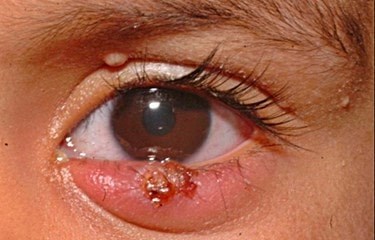Herpes keratitis is an infection of the eye caused by the herpes simplex virus (HSV).
This particular strand is also known as HSV-1. It’s the most common form of the virus. It accounts for what we call cold sores or fever blisters. HSV-1 typically affects different areas on or around the face, including the eyes.
If you’ve experienced cold sores before, you already have the virus. This can make you prone to cold sore breakouts. Or, it can cause the virus to spread to around the eye. Even though both conditions are caused by the virus, they need to be treated differently.
Like any other viral infection, herpes simplex keratitis is caused by exposure and direct interaction. If you notice someone who has a cold sore, for example, and direct contact with them can spread the virus to your body and cause an outbreak.
There are additional causes that can trigger these flare-ups. Once you know what the cold sore triggers are for yourself, you may be able to seek out a treatment sooner.
What Are the Causes of Herpes Simplex Keratitis?
About 90% of the population will be exposed to HSV-1 at some point. Once the virus is inside you, it lasts a lifetime. But most of the time it remains completely dormant and doesn’t cause any issues. Flare-ups happen for different reasons, and some people seem to be more prone to them than others.
If you’ve ever had a cold sore, think of herpes simplex keratitis as a cold sore in the eye. It comes from the same virus, and the potential causes aren’t that different from what might cause a fever blister flare up. Some of the most common causes include:
More often than not, the virus affects areas on the outer eye. This includes the inside and outside of the eyelid, and occasionally the cornea. In very rare occurrences, it can spread to the inside of the eye.

What Are the Symptoms?
Any infection of your eye will cause pain and discomfort. This virus comes with an even longer list of symptoms to be aware of, including:
- Redness
- Light sensitivity
- Tears
- Blurred vision
- Discharge from the eye
If left untreated, it may travel deeper into the cornea and cause more permanent damage. Unlike a cold sore, it’s important not just to let it clear up on its own. Without treatment, you run the risk of damaging your vision and causing extensive damage.
What Are the Best Treatment Options?
The earlier it’s treated, the less invasive the treatment. In many cases, if treatment starts soon enough, the virus can be eliminated with medication. Here are the options:
- Topical cream
- Steroid eye drops (corticosteroids)
- Antiviral prescription pills
Even if the infection appears to have cleared up, you should continue using/taking the medication. If you don’t, it could easily return.
In some cases, an ophthalmologist may be able to scrape away the infected cells from the eye as a means of treatment. In more severe cases, including the loss of vision, you may have to undergo a corneal transplant.
The importance of seeing an eye doctor quickly can’t be understated. You should never try to treat the condition on your own. In fact, some medications, eye drops, etc., could make the virus worse. Talk to a licensed ophthalmologist as soon as possible.
How to Prevent Cold Sores around the Eye
There are a few things you can do to help prevent outbreaks from recurring.
- If you have a cold sore near the mouth and touch it, only to touch your eye, the infection can spread to the eyes. Consider using a patch to cover the cold sore. This will conceal it and prevent it from spreading from the face to the eyes.
- Things like eye drops and contact lenses can also cause problems. If your contact lenses have been used while you have the virus, they can spread the virus.
- Don’t share towels with other people, and always wash your towel(s) after usage.
- Take steps to manage the triggers of cold sores near the eyes. For example, if they’re triggered by stress, consider relaxation techniques or making lifestyle modifications.
- Wash your hands regularly, especially if you’ve been mixing with other people.
How to Control Herpes Simplex Keratitis
Doing what you can to prevent the spreading of the virus is essential. It can lessen the treatment needed, and keep the condition from coming back again and again.
If you think that you have the herpes simplex keratitis, you should see an ophthalmologist as soon as possible. Never wait for the virus to go away on its own as it could cause further damage to the eye.